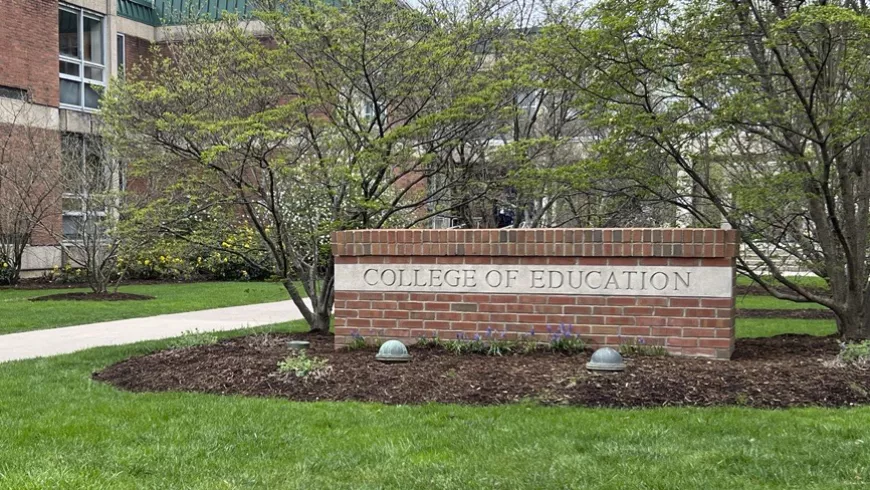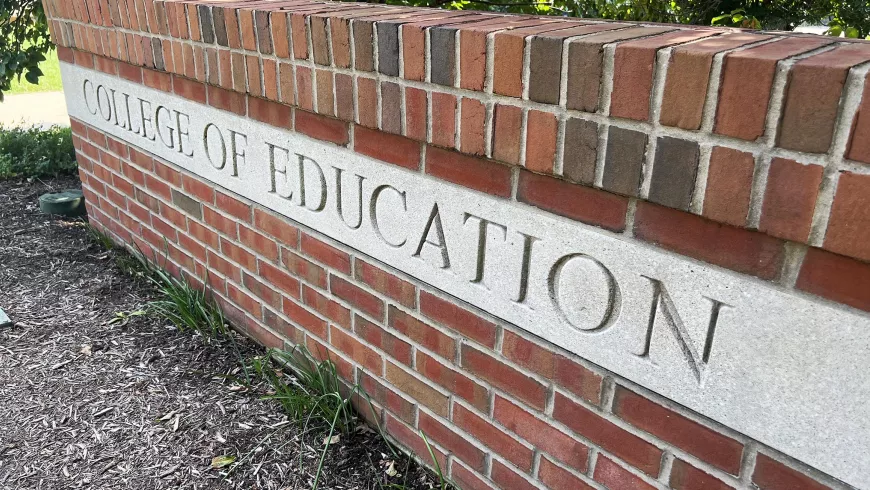Learn Online
Complete your Penn State course work online at your own pace.
Application deadline
Credits and costs
Become a Transformational Leader in Education
Lead small- and large-scale change and innovation with knowledge, tools, and a strategic mindset.
Advocate for equitable learning outcomes for children, youths, families, and adults.
Advance a culture of educational excellence by supporting lifelong learning within and across educational sectors.
Address problems of practice with an interdisciplinary focus to identify, develop, and implement practicable solutions.
Customize Your Online Course List
Customize Your Online Course List
This doctorate-level education degree program draws from several disciplines and affords you the opportunity to customize your curriculum by picking from a range of emphasis areas, including adult education; organization development and change; higher education; learning, design, and technology; educational leadership; and special education.
Completion of a research capstone experience addressing problems of practice is required for graduation from the program. This experience should extend beyond course work and be part of an extended online community.
Prescribed Courses (25 credits)
- 3credits
Provides a survey of major trends in the field of comparative and international education in the last half of the 20th century.
- 3credits
Provides an overview of the skills necessary to design, implement, and assess research studies.
- 3credits
Gives an overview of the fundamentals of reading, evaluating, and conducting evaluations of programs in educational settings.
- 3credits
Through this course, students become more comfortable with analyzing quantitative data sets. Topics include teacher-directed review, modeled analyses, and guided practice. Participants will practice analyses and interpretation with data sets.
- 3credits
Through course readings and the engagement of qualitative research techniques, students will situate and assess qualitative research studies within a broader research context, develop the ability to articulate a coherent research design, gain experience in foundational qualitative methods and analysis, be able to discern what questions are appropriate to qualitative research, and synthesize and write up results of data analysis.
- 3credits
This course studies various education research theories including include Post-Positivism, Interpretivism, the Critical Tradition, Post-Structuralism, and Pragmatism.
- 6credits
Students will research and critically analyze a topic aligned with their career interests. The course covers all phases of the research process from identifying problems of practice to reviewing literature, identifying study methods and analytical techniques, and scholarly writing of research papers.
- 1credit
Students will meet for an intellectually stimulating five-day, in-person summer summit at the University Park campus. As part of the residency requirement, the summer summit includes members from all doctoral cohorts and provides a series of workshops and professional development opportunities to enhance the online learning experience with face-to-face conversations, mentorship, and research skill development. Each student will complete a minimum of one in-person summit, and students are able to attend more than one summer summit. Costs for travel, lodging, and meals are at the expense of the student.
Electives (12 credits)
Electives will be chosen by students in consultation with their faculty adviser. Students can personalize their degree based on their research interests and career goals (like in these specialized path examples) by selecting their electives from more than 170 online graduate courses offered by the Penn State College of Education within the following areas of emphasis:
- Curriculum and Instruction
- Educational Leadership
- Higher Education
- Learning, Design, and Technology
- Lifelong Learning and Adult Education
- Organization Development and Change
- Special Education
Start or Advance Your Career

Start or Advance Your Career
This degree program is based on a flexible, research-intensive, and practical model of study that can prepare students for rewarding professions in the education, counseling, and human services fields.
Job Titles Related to This Degree
At every level, from kindergarten through post-graduate studies, education is in a state of rapid evolution. The advancement of education for future generations relies on passionate and skilled leaders with years of experience in the field who have chosen to pursue the highest level of education degree available from a renowned program.
The knowledge you can gain in this program can be immediately applied in your current role and lead to promotion or career expansion in the private sector or government.
The following roles are often held by people with this type of degree:
- Academic Affairs Director
- Career Development Counselor
- Enrollment Management Vice President
- Higher Education Administrator
- Instructional Technology Director
- Learning Development Specialist
Employment Outlook for Occupational Fields Related to This Degree
Estimates of employment growth and total employment are provided by the U.S. Bureau of Labor Statistics and are subject to change. While these occupations are often pursued by graduates with this degree, individual outcomes may vary depending on a variety of factors. Penn State World Campus cannot guarantee employment in a given occupation.
Educational, Guidance, and Career Counselors and Advisors
Education Administrators, Postsecondary
Instructional Coordinators
Education Administrators, Kindergarten through Secondary
Education Teachers, Postsecondary
Education Administrators, All Other
Career Services to Set You Up for Success

From the day you're accepted as a student, you can access resources and tools provided by Penn State World Campus Career Services to further your career. These resources are beneficial whether you're searching for a job or advancing in an established career.
- Opportunities to connect with employers
- Career counselor/coach support
- Occupation and salary information
- Internships
- Graduate school resources
Ready to Learn More?
Get the resources you need to make informed decisions about your education. Request information on this program and other programs of interest by completing this form.
Ready to take the next step toward your Penn State doctorate?
Costs and Financial Aid
Costs and Financial Aid
Learn about this program's tuition, fees, scholarship opportunities, grants, payment options, and military benefits.
Costs and Financial Aid
Graduate Tuition
Graduate tuition is calculated based on the number of credits for which you register. Tuition is due shortly after each semester begins and rates are assessed every semester of enrollment.
2025–26 Academic Year Rates
| How many credits do you plan to take per semester? | Cost |
|---|---|
| 11 or fewer | $1,037 per credit |
| 12 or more | $12,448 per semester |
Financial Aid and Military Benefits
Some students may qualify for financial aid. Take the time to research financial aid, scholarships, and payment options as you prepare to apply. Federal financial aid may only be used to pay for credits used to satisfy program requirements.
Military service members, veterans, and their spouses or dependents should explore these potential military education benefits and financial aid opportunities, as well.
Additional Cost of Attendance Details
To view the detailed list of cost of attendance elements:
- visit the Tuition Information site
- click the plus sign to expand the table
- select a semester from the World Campus row
Technical Requirements
Review the technical requirements for this program.
Be Part of a Highly Competitive Education Program
Be Part of a Highly Competitive Education Program
This academically rigorous online Doctor of Education program chooses a select group of the most qualified candidates to study with Penn State’s highly regarded and experienced faculty.
If accepted into the program, you will have the opportunity to gain a deep and nuanced understanding of how to apply critical thinking, research, and data to solve problems and make decisions facing educators, counselors, and organizational leaders.
Penn State awards graduates of this program a D.Ed., recognized as a Doctor of Education degree and equivalent to an Ed.D. Unlike other programs, it is neither cohort-based nor specific to a single discipline, being offered across the entire College of Education.
Shape the Future of Education and Drive Student Success
Shape the Future of Education and Drive Student Success
Prepare yourself for an influential role by earning the highest level of education degree available. Learn to apply research and data to solve the problems and guide the decisions facing educators, counselors, school administrators, and organizational leaders with this terminal degree.
The program is centered on developing knowledge pertinent to problems of practice, as well as the inquiry skills and disciplinary practices to develop, understand, and apply research in new situations.
Specialization Elective Example Paths
Specialization Elective Example Paths
The four elective courses that you choose are intended to expand your knowledge base to an area beyond the focus of your existing master’s degree.
You will choose your electives in consultation with your program and faculty advisers to coalesce with the focus of your ensuing doctoral capstone project. Some examples of elective selections based on student interests are shown below to help you envision possible areas of specialization:
Teachers or trainers working with adults in educational or corporate settings may benefit from electives from our lifelong learning and adult education program or organization development and change program:
- ADTED 505: The Teaching of Adults
- ADTED 581: Social Theory and Lifelong Learning
- WFED 865: Implementing Training as an Organization Development Intervention
- WFED 880: Facilitating Groups and Teams
Teachers, administrators, and other education professionals looking to expand their knowledge or advance into leadership positions in educational settings may be interested in electives from our educational leadership program or curriculum and instruction program:
- C-S 562: Methods of Classroom Supervision and Coaching
- C-S 563: Designing Staff Development Programs
- EDLDR 841: Data-Informed Leadership
- EDLDR 861: Principles of Instructional Leadership
Instructional and learning designers, trainers, or educational technology specialists working in traditional education settings, cyber schools, remote/virtual environments, or business training programs may benefit from courses within the learning, design, and technology program; the lifelong learning and adult education program; or the organization development and change program:
- ADTED 533: Global Online and Distance Education
- LDT 843: Learning Technologies for Good and Evil
- SPLED 802: Design and Delivery of Evidence-Based Instruction for Learners with Special Needs
- WFED 876: Facilitating Organization Development and Change through Technology
Those involved in diversity, equity, and inclusion efforts within their organization could find elective courses from our educational leadership program or special educationprogram:
- EDLDR 831: Leadership for Equity and Diversity
- EDLDR 859: Planned Change for School Improvement
- SPLED 525: Teaching Learners with Disabilities in Inclusive Settings
- SPLED 811: Ethical Considerations for Special Education Populations
Student service professionals, institutional researchers, and others working within higher education may be interested in electives from our higher education program, such as:
- HIED 545: Foundations in Higher Education and Student Affairs
- HIED 801: Foundations of Institutional Research
- HIED 807: Foundations of Academic Advising
- HIED 860: Enrollment Management
With more than 170 total courses to choose from, you can work with your faculty adviser to select the electives that best fit your career aspirations. Your specialization area will not appear on your diploma.
Who Should Apply?
The D.Ed. program is designed for people who want leadership roles that shape the future of education. Our students are often working professionals from a variety of fields, including early childhood, elementary, and secondary education; government agencies; or postsecondary education.
Set Your Own Pace

Set Your Own Pace
Penn State World Campus can help you achieve your education goals as you navigate your personal and professional schedules. In the online doctoral program, many students take one or two courses per semester and the typical student is expected to complete the program in three to four years.
Students are required to complete the program within 8 years of completion of the qualifying exam.
There is a suggested sequence of courses. Students will take 6 to 7 credits during fall and spring semesters and 3 to 4 credits during the summer. Online courses typically follow a 12- to 15-week semester cycle, and there are 3 semesters per year (spring, summer, and fall).
However, there is some flexibility in the number of credits each semester, and some students may take fewer or more as their schedule permits. It is recommended that core courses be taken as early as possible. Core courses will be offered on a set schedule as the program expands.
Convenient Online Format
This program's convenient online format gives you the flexibility you need to study around your busy schedule. You can skip the lengthy commute without sacrificing the quality of your education and prepare yourself for more rewarding career opportunities without leaving your home.
A Trusted Leader in Online Education

Penn State has a history of more than 100 years of distance education, and World Campus has been a leader in online learning for more than two decades. Our online learning environment offers the same quality education that our students experience on campus.
How to Apply to Penn State

How to Apply to Penn State
Apply by September 15 to start January 12
Application Instructions
Deadlines and Important Dates
Complete your application and submit all required materials by the appropriate deadline. Your deadline will depend on the semester you plan to start your courses.
Spring Deadline
Apply by September 15 to start January 12Fall Deadline
Apply by February 15 to start August 24
Steps to Apply
For admission to the J. Jeffrey and Ann Marie Fox Graduate School, an applicant must hold either (1) a baccalaureate degree from a regionally accredited U.S. institution or (2) a tertiary (postsecondary) degree that is deemed comparable to a four-year bachelor's degree from a regionally accredited U.S. institution. This degree must be from an officially recognized degree-granting institution in the country in which it operates.
Applicants to the D.Ed. program must have a master’s degree in education or a related field conferred at the time of application. Admitted students may be required to complete additional course work as determined by the academic program upon admission.
You will need to upload the following items as part of your application:
Official transcripts from each institution attended, regardless of the number of credits or semesters completed. Transcripts not in English must be accompanied by a certified translation. Penn State alumni do not need to request transcripts for credits earned at Penn State but must list Penn State as part of your academic history. If you are admitted, you will be asked to send an additional official transcript. You will receive instructions at that time.
Test Scores — GRE or GMAT scores are not required.
English Proficiency — The language of instruction at Penn State is English. With some exceptions, international applicants must take and submit scores for the Test of English as a Foreign Language (TOEFL) or International English Language Testing System (IELTS). Minimum test scores and exceptions are found in the English Proficiency section on the Fox Graduate School's "Requirements for Graduate Admission" page. Visit the TOEFL website for testing information. Penn State's institutional code is 2660.
Letters of Recommendation — Letters of recommendation are crucial for your application. Three recommendation letters are required. Emphasis should be on academic and professional references. References should highlight achievements, leadership qualities, and academic potential. We value insights from those who can confirm your abilities, dedication, and impact, and who are familiar with your academic achievements, career path, and potential.
Program-Specific Questions/Materials
Personal and Career Goals Statement — The goal statement plays a vital role in the admissions process. Successful applicants focus on weaving a compelling narrative that addresses their work, challenges, and areas of interest. The goal statement should express the relevance of this professional doctoral degree to your present and future interests. While not required, applicants may emphasize any affiliations with or interest in particular faculty or programs in the College of Education. Central to the World Campus D.Ed. is the exploration of compelling problems of practice in education. Applicants are welcome to identify and share problems of practice relevant to their work in their goal statement. We believe an acceptable personal and career goals statement can be addressed in three to four double-spaced pages.
Résumé or Vitae — Upload your résumé or vitae to the online application.
Writing Sample — Your writing sample can be a published article, portion of your master's thesis, paper submitted for a course, or a work/professional paper. We are mostly interested in seeing your ability to express your thinking in words and write at a graduate level.
To begin the online application, you will need a Penn State account.
Create a New Penn State Account
If you have any problems during this process, contact an admissions counselor at [email protected].
Please note: Former Penn State students may not need to complete the admissions application or create a new Penn State account. Please visit our Returning Students page for instructions.
You can begin your online application at any time. Your progress within the online application system will be saved as you go, allowing you to return at any point as you gather additional information and required materials.
- Choose Enrollment Type: "Degree Admission"
- Choose "WORLD CAMPUS" as the campus
Checking Your Status
You can check the status of your application by using the same login information established for the online application form.5. Complete the application.
Admissions Help
If you have questions about the admissions process, contact an admissions counselor at [email protected].
Contact Us

Contact Us
Have questions or want more information? We're happy to talk.
To learn more about the Doctor of Education program, please contact:
Dr. Joseph Polizzi
Director of the World Campus Online Doctor of Education Program
[email protected]
Learn from the Best
Learn from the Best
This degree program is offered by the Penn State College of Education. Our goal is to help shape tomorrow’s leaders in the dynamic fields of education, counseling, and human services. Through the program, you’ll have the unique opportunity to learn from our renowned faculty in a collaborative environment.
Faculty
Gerald K. LeTendre
- DegreePh.D., Education, Stanford University
- DegreeM.S., Sociology, Stanford University
- DegreeB.A., Sociology, Harvard University
Dr. Gerald K. LeTendre is the Harry Lawrence Batschelet II Chair of Educational Administration at Penn State and co-editor of the American Journal of Education. His current research focuses on the impact of online learning and other information technologies on teacher-led professional development and teacher work roles. Dr. LeTendre has published on a broad range of topics in educational policy and comparative/international education. He is co-editor (with Motoko Akiba) of the International Handbook of Teacher Quality and Policy (Rutledge, 2017).
Joseph Polizzi
- DegreePh.D., Educational Administration and Leadership, Penn State
- DegreeM.S., Secondary Education, Hofstra University
- DegreeB.A., English, Le Moyne College
Dr. Joseph Polizzi began his career as New York State Senate Fellow and policy analyst on the Senate Education Committee, followed by service as a high school English teacher. Awarded a Fulbright to teach English in Hungary, he also taught English as a Second Language at the University of Pécs. His research focuses on the qualities of ethical relationships in school settings, transformative learning from many perspectives and traditions, and the social and emotional landscape of learning. His recent book is Understanding Suffering in Schools: Shining a Light on the Dark Places of Education (2023).
News





